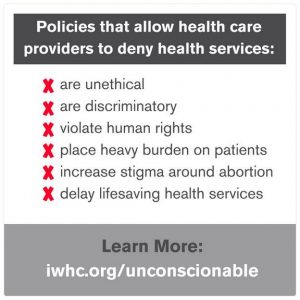The following letter was submitted to the Irish Times on June 9, 2017, but not printed.
“Conscientious objection” kills women
We object to the ill-informed letter (June 5, Italy and Abortion) by Dr Angelo Bottone of the Iona Institute – a conservative Catholic organization. He claims that a pregnant woman in Italy did not die because she was refused an abortion. We (a gynecologist and an advocate) have followed the case of Valentina Milluzzo, the 19-weeks pregnant woman who died of sepsis on October 16, 2016 in Catania Italy, and we are in contact with her family. In reality, Valentina’s death is scarily similar to that of Savita Halappanavar, the pregnant dentist who was left to die in an Irish hospital 5 years ago.
In Valentina’s case, the timeline of events, medical facts, and witnesses all contradict the conclusion of the “investigations” by authorities. In fact, Valentina’s doctors claimed “conscientious objection” and refused to perform a medically-required termination of pregnancy. She died because the necessary standard of care in her case was delayed until it was far too late to save her. Valentina had been in hospital for two weeks already, suffering from a threatened miscarriage of twins. But doctors refused to act even after the first twin died, and even after she predictably developed sepsis 12 hours before she died. A doctor objected that “The child’s heart is still beating,” even though the pregnancy was doomed in any case.
Sepsis is a very rapid and life-threatening infection that must be prevented, not managed as if the life of a fetus outranks a woman’s life. If sepsis occurs, doctors have only minutes to act – not hours to wait. For doctors to allow Valentina’s health to deteriorate until her life was in “imminent danger” is unconscionable. She also spent many hours in agony while sepsis destroyed her organs – but without pain relief or medical attention because doctors dismissed her pain as “renal colic” or “the pains of childbirth”.
The very fact that Valentina died is undeniable proof that the abortion was done way too late. It also shows that the provision to allow abortion when a woman’s life is in danger does not work, because doctors can’t be absolutely certain about the risk of death until the patient is dead. “Conscientious objectors” disobey the law by gambling with women’s lives, like they also did with Savita. It was the “conscience” of doctors that killed Valentina.
Christian Fiala MD, PhD, Gynmed Clinic, Vienna, Austria
Joyce Arthur, Executive Director, Abortion Rights Coalition of Canada, Vancouver BC



 European Journal of Obstetrics & Gynecology and Reproductive Biology
European Journal of Obstetrics & Gynecology and Reproductive Biology